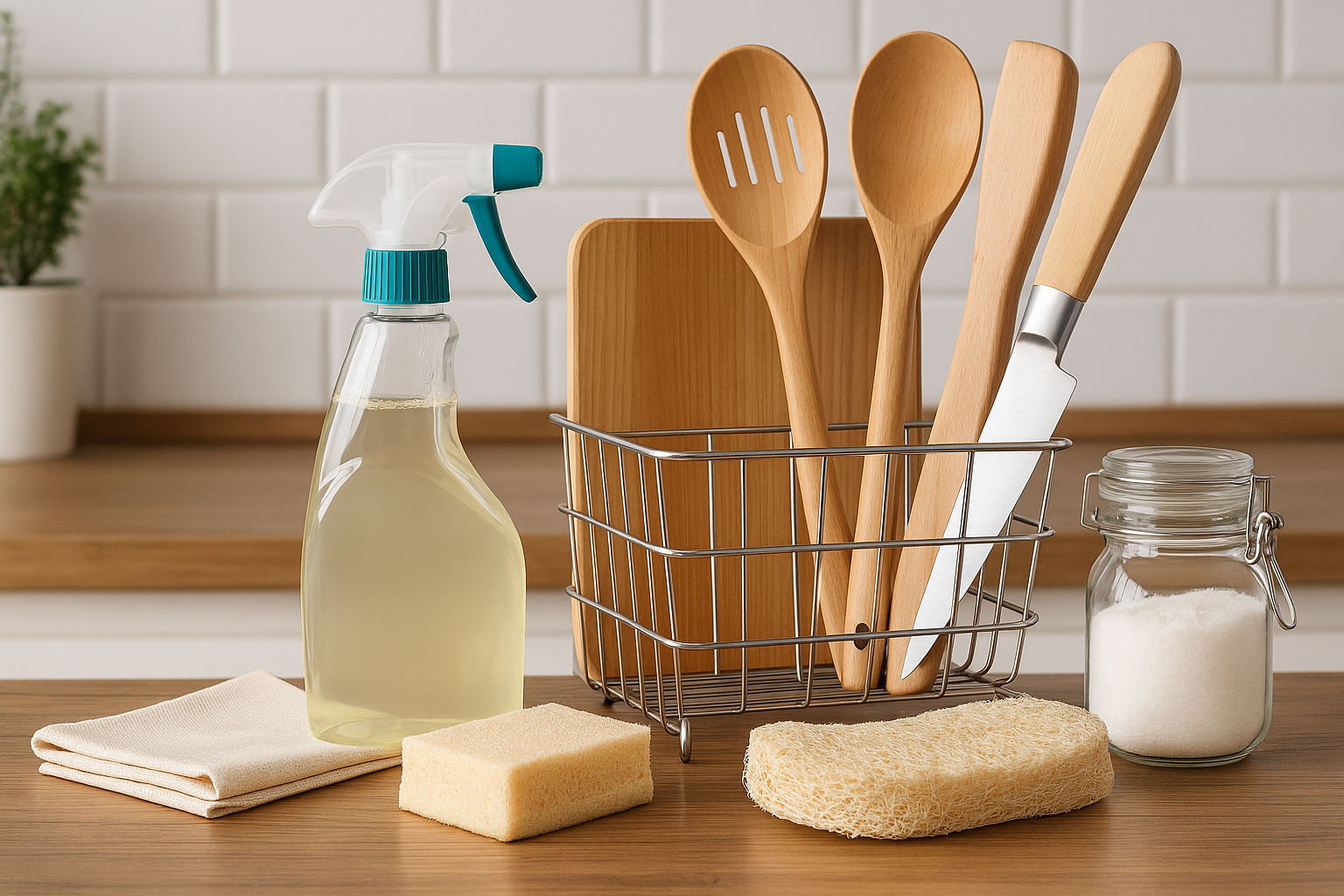Keeping your kitchen accessories clean is important for a healthy home. Dirty utensils, cutting boards, and containers can hold germs that cause illness. Regular cleaning and proper maintenance stop bacteria from growing and keep your kitchen safe.
Whether you’re using basic everyday tools or premium kitchen accessories like those found at BTC hardware, keeping everything clean and well-maintained makes a big difference in your kitchen’s safety and efficiency.
You don’t need special tools or products to clean your kitchen accessories well. Simple steps like washing with hot, soapy water and drying items completely can make a big difference. Knowing how to care for each type of material also helps your tools last longer.
By making these cleaning habits part of your routine, you protect your family from harmful germs. This article will guide you through easy ways to clean and maintain your kitchen accessories so your home stays healthier.
Understanding the Importance of Kitchen Accessory Hygiene
Keeping your kitchen accessories clean is more than just about making things look neat—it directly affects your home’s health. When your kitchen tools are properly cleaned, you’re not only protecting your utensils, but also your family’s well-being. A well-maintained kitchen helps limit germs, keeps the air fresh, and ensures your accessories last longer, making cooking and cleaning a much smoother process.
Reducing Germs and Cross-Contamination
It’s easy to forget just how much kitchen tools come into contact with raw meat, vegetables, and other foods. If they aren’t cleaned properly, they can spread harmful bacteria like Salmonella or E. coli. Regular washing with hot, soapy water can kill most germs on items like cutting boards, knives, and countertops. This is especially important in a busy kitchen where the pace is quick and there’s constant movement.
Having separate tools for raw and cooked foods is another simple step to prevent germs from transferring. You can even sanitize with a mild bleach solution or vinegar spray for added protection. By taking these small steps, you’re reducing the risk of foodborne illnesses and making your kitchen a safer place for everyone.
Impact on Air Quality and Allergies
It’s easy to overlook the little bits of dust and food particles that can accumulate on kitchen accessories. Over time, these can affect the air quality in your home, creating a breeding ground for mold, bacteria, and even pests. If you or your loved ones suffer from allergies or asthma, these little particles can make symptoms worse.
The good news? It doesn’t take much to make a difference. Wiping down your kitchen accessories right after you use them helps reduce moisture buildup and prevents mold. Habits like regularly emptying your sponge or cloth and airing out drying racks can also make your kitchen feel fresher. Simple actions like these create a healthier environment for everyone who spends time in the kitchen.
Prolonging the Lifespan of Your Accessories
Not only does cleaning keep your kitchen hygienic, but it also prevents damage to your kitchen tools. For example, drying wooden utensils immediately after use helps avoid cracking, while removing metal residues from knives can prevent rust. Regular care ensures your accessories last much longer, saving you money in the long run.
Taking just a little time to oil wooden boards, sharpen knives, and maintain your accessories will ensure they work better and last longer. By keeping your tools in good shape, you’re also making food prep easier and safer.
Cleaning Techniques for Common Kitchen Tools
Different kitchen tools require different cleaning techniques. Using the right methods helps stop germs from spreading and keeps your kitchen running smoothly. Let’s break down how to clean some of the most common kitchen accessories:
Proper Care for Cutting Boards
Always wash your cutting boards with hot, soapy water immediately after use to prevent bacteria buildup. For wooden boards, avoid soaking them in water, as this can cause them to crack and warp over time. You can sanitize wooden boards by wiping them with white vinegar or a mix of water and lemon juice. Plastic boards, on the other hand, are dishwasher safe, but always check the label to be sure.
To keep your boards fresh and odor-free, sprinkle some coarse salt on them and scrub with a lemon half. Rinse well and let them dry completely before storing. If your boards have deep grooves or cracks, it’s time to replace them. These areas can trap bacteria and are hard to clean properly.
Safe Cleaning of Knives and Utensils
Knives should always be hand-washed using warm, soapy water. Never put sharp knives in the dishwasher—it can dull the blades and cause damage. Use a gentle sponge or cloth to clean the knives, always wiping the blade away from your body to avoid cuts.
For utensils made from metal or plastic, check if they’re dishwasher-safe. If so, place them in the dishwasher with the handles up. After washing, dry all knives and utensils right away to prevent rust and corrosion.
Sanitizing Food Storage Containers
Before washing your food storage containers, rinse them with warm water. Then, clean them with hot, soapy water or toss them in the dishwasher if it’s safe for the material. To get rid of stubborn odors, soak your containers in a mixture of baking soda and water for about 15 minutes, then wash them again.
Lids often have grooves that trap food, so give them a thorough cleaning with a brush to reach tight spots. After washing, store your containers upside down or open to allow them to air dry completely. This helps prevent mold and bacteria growth.
Maintaining Small Appliances
Unplug your small appliances before cleaning for safety. Wipe down the outside with a damp cloth to remove any spills or stains. For blenders and food processors, remove the detachable parts and wash them in warm, soapy water or place them in the dishwasher if the manufacturer permits.
Don’t forget to clean the appliance filters regularly. Clogged filters can reduce performance and even damage the appliance. And always avoid using harsh chemicals on your appliances, as they can harm the surfaces. Allow appliances to dry completely before storing them.
Ongoing Maintenance for a Healthier Kitchen
Keeping your kitchen clean is an ongoing process. Set up a simple routine, check for wear and tear, and consider using safer cleaning options to protect your health and the environment. It’s all about building habits that make your kitchen healthier and more functional for everyday use.
Routine Scheduling and Best Practices
Creating a cleaning schedule that works for your kitchen use is essential. For example, wash cutting boards and knives after each use to stop bacteria from growing. Use hot, soapy water to clean most tools, and always dry them well to avoid mold and rust. If you have small items that are dishwasher-safe, you can save time by using the dishwasher.
To help you stay on top of things, use a calendar or an app to track your cleaning tasks. This way, nothing gets overlooked.
Checking for Wear, Mold, or Damage
Regularly inspect your kitchen tools for signs of wear and tear, such as cracks, rust, or discoloration. These areas can harbor germs. Plastic cutting boards with deep grooves should be replaced as bacteria can get trapped. Always check for mold on sponges or wooden spoons. If you spot any, throw the item away immediately.
Eco-Friendly Cleaning Alternatives
If you’re looking for a more natural way to clean your kitchen, try using green cleaning products like white vinegar, baking soda, or lemon juice. These options are less harsh on your skin and safer for your kitchen. You can mix vinegar with water to clean surfaces and kill germs. Baking soda works great for scrubbing tough stains.
Avoid harsh chemicals that can leave toxic residues. Natural cleaning products not only protect your health but also keep your kitchen environment safe.
Conclusion
Keeping your kitchen accessories clean is more important than you might think—it goes beyond aesthetics and affects your home’s overall health. By following a few simple habits, like regular cleaning and maintenance, you can create a safer, more organized kitchen for you and your family. Small actions like drying your utensils right away or using natural cleaning products go a long way in keeping your kitchen in top shape. Healthy habits today lead to a cleaner, more functional kitchen tomorrow.

